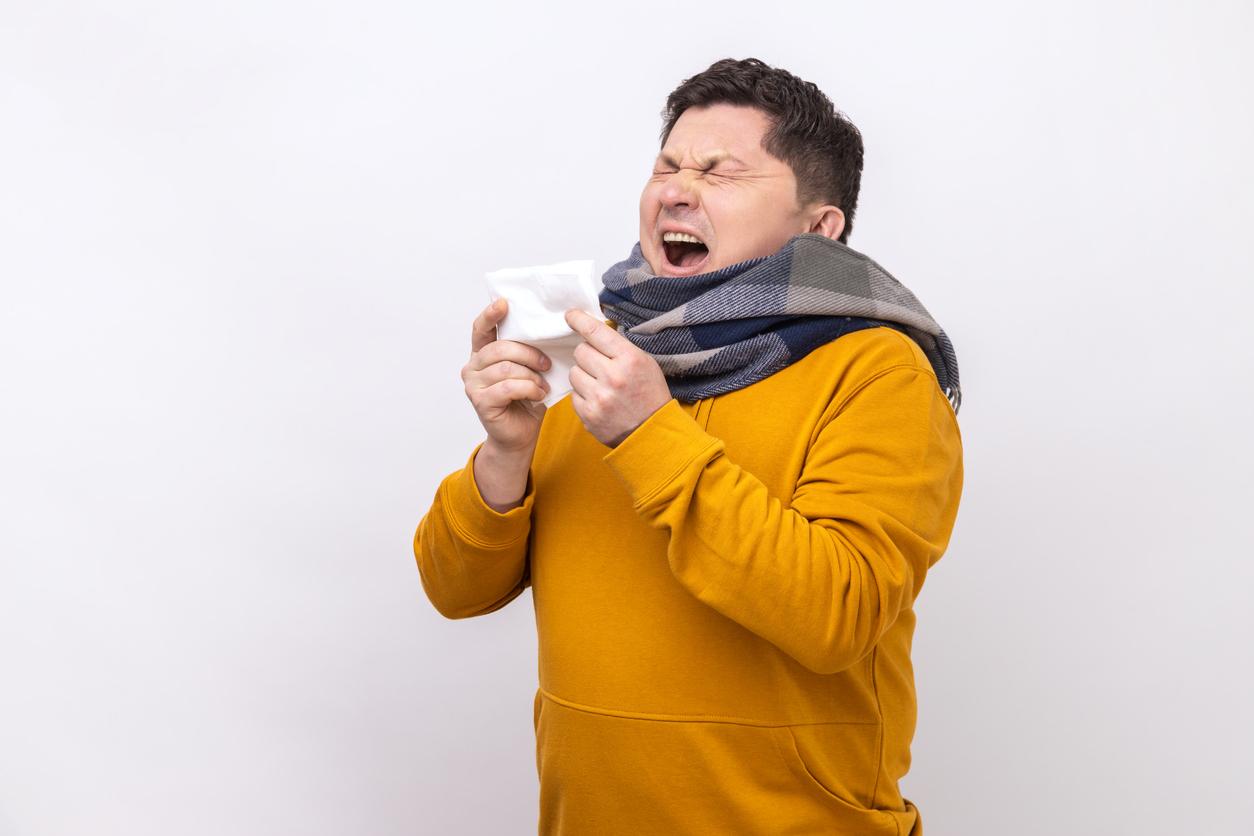Causes, symptoms, and treatment for sinus infections
Key takeaways
- Sinus infections are commonly caused by viruses but can also be caused by bacteria and fungi
- Common sinus infection symptoms include congestion, a runny nose, and facial pain
- Many acute sinus infections can be treated with OTC medicine and at-home remedies
Causes, symptoms, and treatment for sinus infections
A sinus infection (acute sinusitis) is inflammation of the nasal cavities, usually caused by an infection. These spaces can become infected, inflamed, and swollen, leading to uncomfortable symptoms such as a stuffy nose and facial pain. So, what is a sinus infection? How do you know if you have one?
This article will examine the different types of sinus infections, their causes, and more.
What is a sinus infection?
Sinus infections—also known as acute sinusitis or rhinosinusitis—are infections of the nasal cavities or sinuses. Sinuses are air-filled spaces behind the nose and cheekbones. These spaces are lined with soft, pink tissue called the mucosa. Sinus infections occur when a pathogen—usually a virus—infects these cavities. This infection causes inflammation, swelling, and an increase in mucus production. These effects lead to the common symptoms of a sinus infection.
Types of sinusitis
Acute sinusitis: Acute sinusitis is a one-time infection of the sinus cavities. It can be caused by a virus, fungus, or bacteria and usually goes away after 7-10 days.
Chronic sinusitis: Chronic sinusitis is sinus inflammation lasting over 12 weeks or recurrent sinusitis (repeated sinus infections). A bacterial or fungal infection, nasal polyps, a deviated septum, or other underlying health problems—such as a compromised immune system—can cause chronic sinus infections.
Acute sinusitis usually goes away independently and can be managed with at-home remedies and over-the-counter medications. Chronic sinusitis often requires medical treatment like prescription medication or sinus surgery.
What are the common symptoms of a sinus infection?
Sinus infections often cause similar symptoms to the common cold or allergies.
Common symptoms of sinusitis include:
- Runny nose (also known as nasal discharge or rhinitis)
- Nasal congestion
- Post-nasal drip
- Bad breath
- Facial pain
- Sinus pressure
- Sore throat
- Ear pain
- Toothache
- Decreased sense of smell
- Fever
Unlike allergies, sinus infections do not cause someone to sneeze or itch.
Talk to a healthcare provider if your symptoms do not go away within a week. You should seek medical attention if your symptoms get worse or a high fever appears. These are common signs of a bacterial infection or fungal sinusitis.
What causes sinus infections?
An upper respiratory infection—like a common cold—most commonly causes sinus infections. The virus that causes a cold also infects the sinus cavities, leading to a runny nose and congestion typical of a sinus infection. In some cases, bacteria develop in these cavities, leading to a bacterial infection of the sinuses.
Other common causes of sinus infections include:
- Allergies
- Nasal passage abnormalities (like a deviated septum or growths in the nasal passage)
- Nasal polyps
- Immune system disorders such as HIV
- The flu (influenza)
Bacterial sinus infections usually occur when an acute sinus infection has not disappeared after ten days. This period allows bacteria to populate and infect the sinus cavities.
Fungal infections generally occur in people with weakened immune systems. These infections are more severe than viral infections and require prompt medical attention.
Chronic sinus infections are infections that last longer than 10–12 weeks. They are caused by similar risk factors as acute sinusitis—such as allergies, viruses, and nasal polyps—but last far longer.
Do I have a sinus infection or a cold?
A sinus infection often causes symptoms similar to a common cold, such as a runny nose and congestion. So, it can be hard to tell if an infection of the sinuses or a cold is causing your symptoms.
Unique sinus infection symptoms include:
- Facial pain
- Tooth or jaw pain
- Bad breath
- Thick nasal discharge
Unique cold symptoms include:
- Body aches
- Sneezing
Sinus infections do not usually cause symptoms below the neck (like body aches). On the other hand, colds do not usually cause facial pain. The location of your symptoms can help you figure out what type of infection you are managing.
How do I test myself for a sinus infection?
A symptom check can help you determine whether or not a sinus infection is causing your discomfort. To test yourself for a sinus infection without seeing a doctor, look out for these symptoms:
- Tenderness or pain around the nose
- Tenderness under the eyes
- Tenderness or pain on the sides of the head or forehead
- Tooth or jaw aches
- Loss of smell or taste
- Thick, green nasal discharge
These common signs can help you differentiate between a sinus infection and another type of respiratory infection.
How do I treat a sinus infection?
Most cases of acute sinusitis can be treated with over-the-counter medicine and at-home remedies. These treatment options will ease your symptoms while your body heals.
OTC medication
OTC medication options include:
Saline nasal spray: Over-the-counter nasal saline sprays (like Sinex) are widely available at most pharmacies. These sprays rinse and clean the nasal passages, reducing symptoms while preventing the infection from worsening.
Steroid nasal sprays: Nasal sprays containing the steroid fluticasone help reduce sinus inflammation. This can reduce symptoms of facial pain, sinus headaches, and congestion.
Decongestants: Decongestants containing pseudoephedrine (like Sudafed) are available over the counter as nasal sprays, oral liquids, or tablets. Decongestants clear up the mucus blockage in the nasal passages, reducing sinus pain and nasal discharge symptoms. You should only use a nasal decongestant for a few days, as repeated use can cause more severe congestion.
OTC Pain Relievers: Pain relievers such as ibuprofen and acetaminophen can help minimize sinus pain and headaches. These drugs will not help clear up a runny or stuffy nose but will help with discomfort caused by inflammation of the sinuses.
Antihistamines: Allergy medication helps reduce your body’s reaction to allergens, irritants, and pollutants. Easing allergic reactions can help reduce inflammation and congestion.
Speak to a healthcare provider if your symptoms have not gone away within a few days.
Home Remedies
You can supplement the over-the-counter medication options with simple home remedies for a sinus infection. These include:
Neti Pot/ sinus rinse: Neti Pots are common appliances used for nasal irrigation. To use one, put iodide and preservative-free salt water into the chamber. It is recommended that you boil the water first to sanitize it. Wait until the water is room temperature before you put it in the Neti Pot. Pour the solution into each nostril, per the device’s instructions. This saltwater rinse can help reduce congestion and pain caused by a sinus infection while cleansing the affected area.
Drink plenty of fluids: Fluids help thin your mucus, allowing it to drain from the nasal passages more easily.
Moisten sinus cavities: Drape a towel over your head and breathe in the vapor from a bowl of hot water. This helps moisturize the nose, drain mucus, and relieve sinus infection symptoms. Alternatively, take a hot shower and inhale the warm, wet air. Use a humidifier at night, ensuring you use filtered water in the chamber.
Warm compress: A warm compress applied to your nose and forehead may help alleviate sinus congestion.
How do I prevent sinus infections?
While not all sinus infections can be prevented, there are several steps you can take to reduce your risk of developing one.
You can reduce your risk of sinus infections by taking these steps:
Protect your health: Avoid people with a common cold or upper respiratory infection. Maintain good hygiene, get plenty of rest, and drink lots of fluids to aid your overall wellness.
Manage allergies: Avoid irritating allergens such as pollen and pet dander. If you haven’t undergone allergy testing, it is recommended that you do so to protect yourself from substances that trigger your symptoms. Work with your healthcare provider to keep allergy symptoms under control.
Do not smoke: Tobacco smoke (including secondhand smoke) and inhaled substances irritate your nasal passages and airways. Refrain from smoking and avoid smoky or polluted environments to prevent irritation.
Humidifiers and steam also work to clear nasal passages and soothe irritation. Make sure your humidifier is clean before use. Humidifiers can become breeding grounds for bacteria and fungi, which can make your symptoms worse if released into the air.
How Sesame can help
Start feeling better right away. Book an online doctor appointment on Sesame to discuss your symptoms and treatment options for your sinus infection. Providers on Sesame can offer medical advice, address your concerns, and prescribe medication if appropriate. Schedule an appointment and get started on treatment today.









